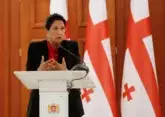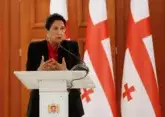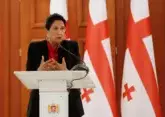Last year’s presidential election marked a number of historic firsts and lasts for Georgia. The nation got its first woman president, first foreign-born president and the last directly elected president. That list is continuing to grow, as Zourabichvili has announced that she is declining her official salary.
Eurasianet reports in its article Georgia’s free president that the French-born Zourabichvili said that she will instead support herself financially through her French retirement income. “I now receive a pension from France… and it is perfectly enough for me,” she said. A descendant of Georgian émigrés, Zourabichvili worked for the French foreign office before returning to her ancestral homeland. She renounced her French citizenship last year to become eligible for the Georgian presidency, but she is still entitled to her retirement income in France.
Zourabichvili has not specified the size of her French pension but local news outlets surmise that it is comparable to what her Georgian salary would be: 6,900 lari a month (just under $2,600).
Reactions to her decision were mixed. Some Georgians don’t mind having a president for free, while others say they wish they actually had a free president: Detractors chargethat Zourabichvili is little but a minion of Georgia’s richest man and effective leader, Bidzina Ivanishvili.
Following her announcement about her salary, one running joke was that the Georgian president’s office has become a retirement home for French officials. Critics argued that being financially reliant on a foreign government raises questions about her loyalty to the state she is supposed to serve. Some joked online that she would soon be seen burning cars in Paris along with the “gilet jaune” protesters who have been agitating for, among other things, pension reform.
Zourabichvili’s supporters, however, welcomed the decision as an act of selflessness. Zourabichvili said that her salary will go toward a new fund meant to underwrite “important matters” and that she hopes to inspire additional private donations to the fund.
Zourabichvili, in fact, has very little cash at her disposal to spend on any initiatives. The Georgian government abolished a $1.9 million presidential fund and made drastic cuts in the funding of the presidential administration. The presidential office also was controversially moved from a grand, cliff-top palace to a humbler downtown building.
The government, dominated by the Georgian Dream party, argued that the cuts reflect the pared-down, largely ceremonial powers of the president. Opposition groups counter that the reduction in powers and funding, combined with the lack of the president’s personal independence from the governing party and its billionaire chief Ivanishvili, renders the presidency a mere decoration.
Granted, Georgia’s shift away from once larger-than-life presidents with larger-than-life powers did not begin with Zourabichvili. Her predecessor, Giorgi Margvelashvili, already had little more than a ceremonial role. Still, he had a sizeable budget to work with and maintained a critical distance from all political groups and figures, including his erstwhile ally, Ivanishvili.
Compared with her predecessor Zourabichvili entered a smaller office in every sense, with her legitimacy challenged by political opponents who claim that Ivanishvili and his Georgian Dream stole the presidential election to install a loyal figure in office.
Zourabichvili has lately provided still more fodder for those speculations, by displaying reluctance to weigh in on an ongoing rift in the ruling party over the appointment of supreme justices that has pitted Ivanishvili against some key members of his own party. “I’m not going to cross a line that defines the president’s purview,” she told reporterswhen asked to comment about the dispute.
She did not elaborate on the types of projects she will try to support through her new fund, but her earlier spending could serve as an indication. She used some money left over from the now-defunct presidential fund to sponsor the publication of two books and a magazine, and to buy a clarinet to lend “to a talented young musician.”










